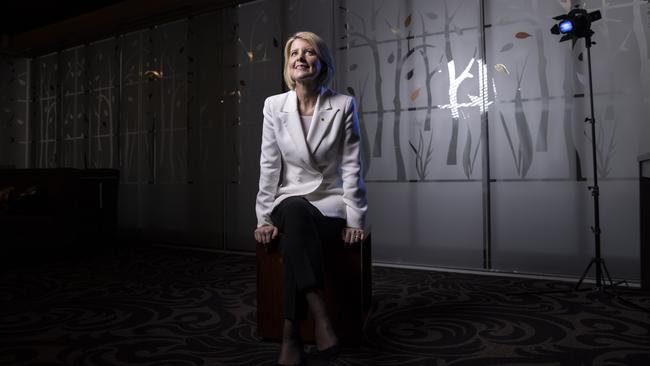Natasha Stott Despoja: ‘The liberties and entitlement of male colleagues was pervasive’ in Parliament
Natasha Stott Despoja started in Parliament at 22. In a blistering opinion piece, she details continual sexual harassment from male colleagues and calls for everyone to engage and create change.
Opinion
Don't miss out on the headlines from Opinion. Followed categories will be added to My News.
The past few weeks have been confronting, anger-making, frustrating and triggering for many of us.
Not only because of the allegations surrounding our nation’s parliament but the derisory reaction of our leaders.
And because we know this is symptomatic of the broader culture and problems in a country where women are not equal and a woman dies violently every week (usually at the hands of someone she knows).
That’s why women (and men) are marching today.
Today, we acknowledge the bravery of survivors and offer solidarity and support.
This year’s International Women’s Day was a bittersweet reminder of the confronting challenges that remain in achieving gender equality.
Today, women are demanding change.
The aim of getting women into, and supporting women in, positions of leadership – especially politics – has been a lifelong passion.

The revelations in national politics over the past few weeks, including the report into parliamentary behaviour in the State Parliament, has made my heart heavy.
It is time for a sweeping review of the federal parliament, its practices and its culture.
We have seen that the environment is toxic and that widespread structural, policy and cultural change are required.
I was 22 when I first worked in parliament and the male power and privilege were palpable.
The liberties and entitlement of male colleagues was pervasive: from the married MP who pursued me as a staffer and then bullied me as a Senator; the ire of male MPs if you rebuffed their overtures; and continual comments about appearance or sexual allusions.
As a relatively young Senator, the sexism and double standards I encountered played out in the media and the parliament.
Like many women, I was subject to unwanted attention, harassment, comments about my appearance (why I didn’t wear skirts more, show my legs?), had to deal with leering businessmen and my pleas to colleagues to step in were often snubbed; I still bristle at the gall of one Senate aspirant who picked me up and kissed me inappropriately on first meeting, and I recoil at the memory of being alone in a quiet corridor with an angry male colleague.
And, then being called ‘princess’ or ‘precious’, not a team player or ‘humourless feminist’ when you complained, and even journalists – some of whom now (thankfully) condemn the sexist culture – also used or repeated sexist slurs to describe our party and me (‘you could rent us by the hour’), a ‘media whore’.
The novelty of being young and female underscored these experiences but no woman really is exempt and these experiences are compounded for women of colour, Aboriginal and Torres Strait Islander women, lesbian, transgendered and women with disabilities.
All of whom have been profoundly under-represented in our parliaments and whose injustices deserve greater attention.
Along with those of older women, the fastest-growing group moving in to poverty.
While the trivialisation and harassment of women in leadership is not new, what’s new are the movements calling out this behaviour.
We have impassioned leadership, especially from the Australian of the Year, Grace Tame who has shone a light on uncomfortable truths, and highlighted the need for legislative and cultural change.
As horrible and distressing as they are, the stories coming out are breaching the wall of secrecy and Australia is starting to see the prevalence and the depth of women’s suffering.
If we are to minimise the risk of violence in our workplaces and provide a supportive environment for victims, then we must take positive actions to create equal and respectful workplaces, including in our parliaments.
My message to – especially young – women is to take over parliament, don’t give up on running for parliament because parliament seems to have given up on us.
My message to men is you need to engage with this – it should not be up to women to fight for gender equality, men have power and they need to use it for good.
You need to step up, be allies, and advocate change.
This is not women’s problem: this is everybody’s business.


